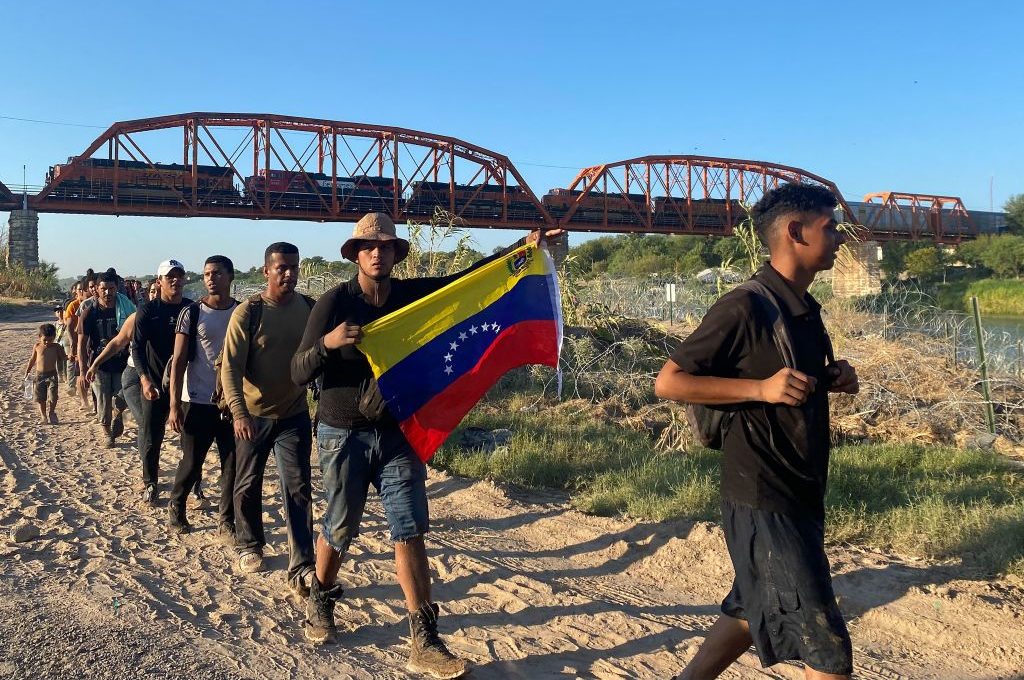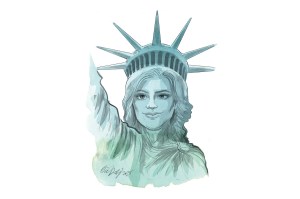My grandma loves to joke about how she got a tooth knocked out by a motorizado (biker) in the Venezuelan capital of Caracas. “¡Dame el aro!” (Gimme the hoop!) exclaimed what looked like an off-duty bodyguard. “My hoop? What the hell?” Grandma thought to herself, before realizing the man was talking about her wedding ring.
“I never wear it when we go to church; I must’ve forgotten that day,” she tells us, in what feels like a skit. “I don’t know what got into me, but after the man pointed at his pocket and said he had a revolver, I said, ‘I have one too!’”
“Show me,” the motorizado inquired as my frozen grandpa thought to himself, “What the hell is she talking about?” She then busted open a drawer of her Toyota Corolla, expecting to scare the guy away, and proceeded to grab a Kleenex box and throw it at his face.
“Gimme the hoop!” he aggressively repeated. My grandma refused. “I could’ve gotten killed. No one knows how you’ll respond in a situation like that one,” she says. And then voilà — my grandma recalled the advice of a radio host, “be crazier than they are.” “I began fake convulsing, beating my own chest,” she says, dramatically reenacting the scene.
After a marvelous performance, the motorizado, maybe revolver-less, maybe prudent, gave up, throwing a a punch to her jaw before driving away. “Take me to the doctor!” she exclaimed to her still paralyzed husband.
The story reveals something dark about life in Caracas: tales without the happy endings abound. I remember watching a man snatch my mom’s BlackBerry and during childhood always hiding phones and sometimes crouching in the backseat.
Retelling anecdotes like these to my friends in the States often leads to amazement and laughs, and sometimes horror. Today, however, those stories feel increasingly less foreign.
Early on June 3, two New York City Police Department officers were shot, reportedly by a Venezuelan migrant on a moped. The suspect had crossed the southern border illegally in Eagle Pass, Texas. In April, another man on a scooter killed one man and injured four others in the Bronx.
“We have taken 9,500 scooters, dirt bikes and ATVs off the streets since January 1 until now. Out of those 9,500, 2,500 in the Bronx alone,” deputy commissioner of operations Kaz Daughtry said in April, following what has become a widespread rise in moped crime.
Meanwhile in Washington, DC, moped-riding Venezuelans have become ubiquitous. Some celebrate how the motorizados have transformed DC’s food delivery scene; others are less enchanted with their recklessness.
According to the city’s DMV, moped registrations increased from fifty-four in 2022 to 143 in 2023, not counting those with missing tags. The Motorized Vehicle Registration Accountability Amendment Act of 2024 was proposed to attempt to regulate what has become uncontrollable.
Three months ago, Georgia, a Venezuelan American who usually drives around Columbia Heights, told me that she frequently finds herself yelling in Spanish at the zig-zagging moped-drivers. A friend, Owen, recently texted, “I now do bets whenever I’m driving around to see if they’ll run a stop sign or a red light. I’m right basically every time. Zero regard for any traffic laws and very few of them have plates. It’s insanity.”
“I saw one guy smash the side view mirrors of an SUV off on Constitution Avenue outside the Air and Space Museum,” another friend, Vinny, said. “He was lane splitting and got angry that a car was stopped trying to get into another lane.”
Even in Miami, it has become a problem, with Univision’s Vianca Rodriguez saying that “they’ve almost made me crash in three different occasions this month.”
Just like that, evidently driven by mass migration, American cities have observed the Venezuelafication of their streets. Of course, not all of these new drivers are from the oil-rich country, but personal experiences and the correlation of more low-skilled Venezuelan migrants with more mopeds provides sufficient evidence to justify the use of the label.
With moped crime on the rise in the US, Venezuela — and Caracas, which has often battled for first place in the “cities with most crime” list — has seen its numbers trend in the opposite direction. The Venezuelan Observatory of Violence reported a 25 percent drop in violent deaths from 2022 to 2023.
I was surprised by improvements in safety when I visited two years ago, and called my childhood friend Luis Fernando for an update on life in Caracas.
“It’s a different country, man,” he told me, arguing that while “Venezuela is still Venezuela, most motorizados seem to be doing Yummy [an Uber equivalent] now.”
“I haven’t heard of an incident for so long. People now drive with their windows down, at any time.”
That might sound like your average Friday, but for the Venezuelans who lived there these past two decades, it sounds like Disneyland. The worst of Venezuela, including the Tren de Aragua gang, has come to El Imperio. Who would have thought? Moped crime in the Land of the Free. Just like the Americans fascinated by my childhood stories, back in Caracas, people can’t believe it. America is, quite literally, importing the third world.


























Leave a Reply